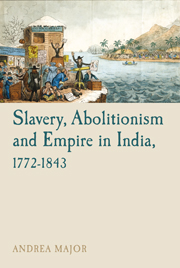Book contents
- Frontmatter
- Contents
- List of Illustrations
- Acknowledgements
- List of Abbreviations
- Glossary
- Some Prominent Figures in the British Parliament, the Abolitionist Movement and the East India Company
- Part I Other Slaveries
- Introduction
- 1 ‘To Call a Slave a Slave’: Recovering Indian Slavery
- Part II European Slaveries
- Part III Indian Slaveries
- Part IV Imagined Slaveries
- Conclusion: ‘Do Justice to India’: Abolitionists and Indian Slavery, 1839–1843
- Select Bibliography
- Index
Introduction
from Part I - Other Slaveries
- Frontmatter
- Contents
- List of Illustrations
- Acknowledgements
- List of Abbreviations
- Glossary
- Some Prominent Figures in the British Parliament, the Abolitionist Movement and the East India Company
- Part I Other Slaveries
- Introduction
- 1 ‘To Call a Slave a Slave’: Recovering Indian Slavery
- Part II European Slaveries
- Part III Indian Slaveries
- Part IV Imagined Slaveries
- Conclusion: ‘Do Justice to India’: Abolitionists and Indian Slavery, 1839–1843
- Select Bibliography
- Index
Summary
In June and July 1833, the Houses of Parliament met to discuss the renewal of the East India Company's (EIC) Charter, the royal grant that allowed this joint stock company first to trade with, and later to rule, India (Fig. 1). Tucked away among sections that removed the Company's remaining trade monopolies, divested it of its commercial functions and transferred greater authority to the parliamentary Board of Control, was a clause stating that by 12 April 1837 ‘all rights over any person, by reason of that person being in a state of slavery, shall cease’. Sponsored by Charles Grant (the younger) and Thomas Babington Macaulay, two men from prominent political families closely connected with both Clapham Sect abolitionism and East Indian trade, this clause was raised in the House of Commons at the same time that the more famous legislation dismantling the system of African chattel slavery in Britain's colonies was beginning its journey through parliament. As the EIC's Indian territories were specifically excluded from the Emancipation Bill, the Charter negotiations offered abolitionists a timely opportunity to put pressure on the East India Company to adopt similar reforms. The sudden attempt to end slavery in India in 1833 was unprecedented, however, for, although the existence of coercive labour conditions on the subcontinent had haunted the peripheries of abolitionist debate throughout the 1820s, Indian slavery had previously been conspicuous primarily by its absence from popular discourses of both colonial philanthropy and parliamentary reform.
- Type
- Chapter
- Information
- Slavery, Abolitionism and Empire in India, 1772–1843 , pp. 3 - 17Publisher: Liverpool University PressPrint publication year: 2012

